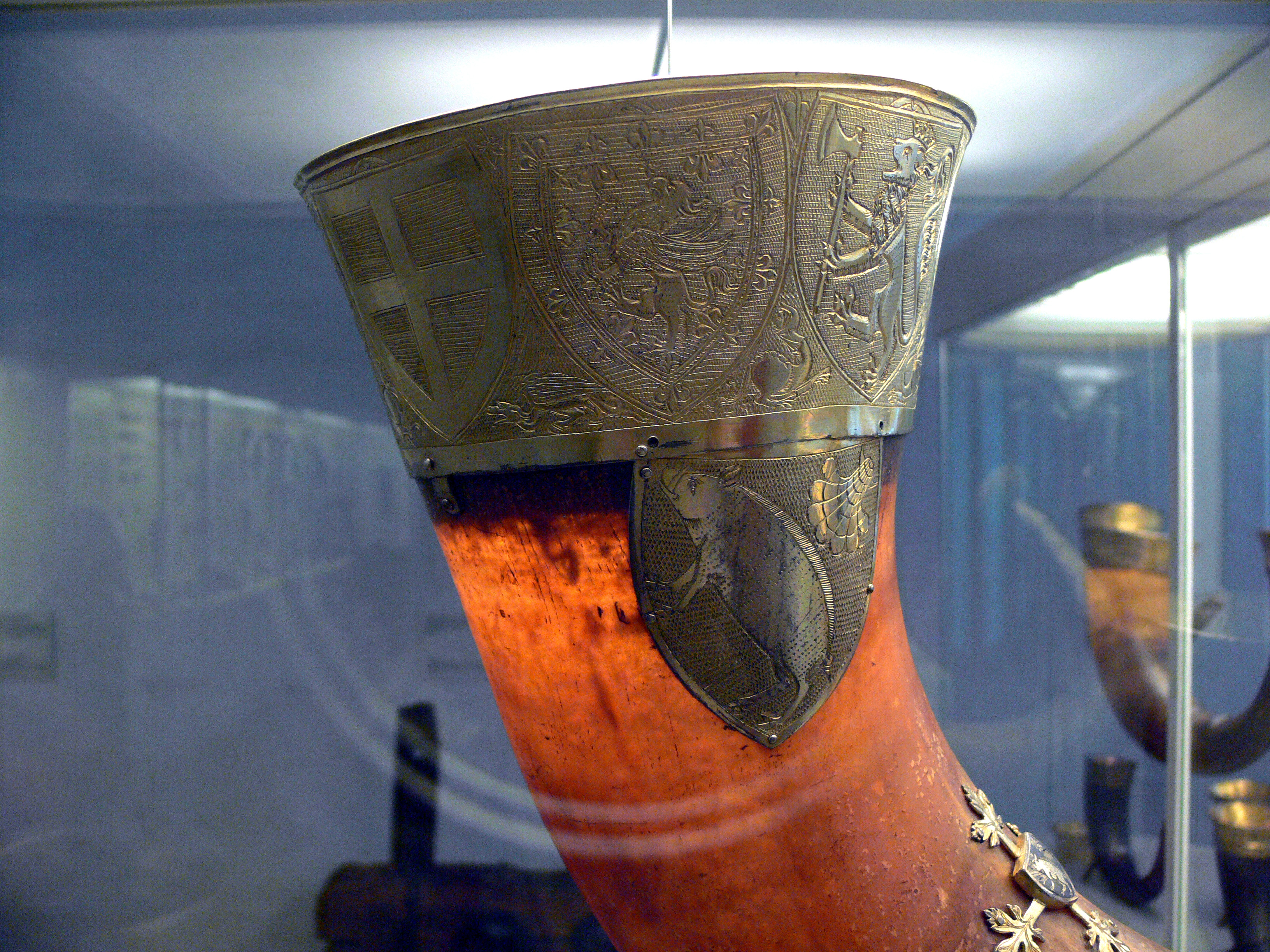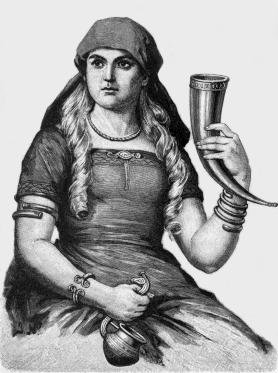Borghild on:
[Wikipedia]
[Google]
[Amazon]
In
 Borghild then arranged a funeral feast for her brother, and she served the drink.
Serving the drink was characteristic of the
Borghild then arranged a funeral feast for her brother, and she served the drink.
Serving the drink was characteristic of the  Borghild's poison worked on Sinfjötli and not Sigmund because of the Volsung blood. According to legend, the Volsung family descended from Odin,Saga of the Volsungs "The Norse Epic of Sigurd the Dragon Slayer" with introduction and translation by Jesse Byock and were therefore part god. Sigmund had more god-like blood in him than Sinfjötli, so Sigmund could withstand the poison, and Sinfjötli could not.
Borghild's poison worked on Sinfjötli and not Sigmund because of the Volsung blood. According to legend, the Volsung family descended from Odin,Saga of the Volsungs "The Norse Epic of Sigurd the Dragon Slayer" with introduction and translation by Jesse Byock and were therefore part god. Sigmund had more god-like blood in him than Sinfjötli, so Sigmund could withstand the poison, and Sinfjötli could not.
Norse mythology
Norse, Nordic, or Scandinavian mythology, is the body of myths belonging to the North Germanic peoples, stemming from Old Norse religion and continuing after the Christianization of Scandinavia as the Nordic folklore of the modern period. The ...
, Borghild was the first wife of Sigmund
In Germanic mythology, Sigmund ( , ) is a hero whose story is told in the Völsunga saga. He and his sister, Signý, are the children of Völsung and his wife Hljod. Sigmund is best known as the father of Sigurð the dragon-slayer, though Sigu ...
. They had two sons, Hamund and Helgi.
''Völsunga saga''
Sinfjötli
Sinfjötli ( ) or Fitela (in Old English) in Norse mythology was born out of the incestuous relationship between Sigmund and his sister Signy. He had the half-brothers Sigurd, Helgi Hundingsbane and Hamund.
Etymology and orthography
''Sinfj� ...
(Borghild's step-son) "saw a lovely woman and strongly desired to have her. The brother of Borghild, the wife of King Sigmund, had also asked for her hand.". Sinfjötli killed the brother in a contest to win the maiden's hand, and Sinfjötli won. He became very famous. When he came home, he told his father Sigmund
In Germanic mythology, Sigmund ( , ) is a hero whose story is told in the Völsunga saga. He and his sister, Signý, are the children of Völsung and his wife Hljod. Sigmund is best known as the father of Sigurð the dragon-slayer, though Sigu ...
what had happened. Sigmund then told Borghild, and Borghild wanted Sinfjötli to leave the kingdom for killing her brother. Sigmund defended Sinfjötli, but offered to pay Borghild compensation. This was a generous offer, similar to Hrafnkel's offer to Thorbjorn for the death of Einar in ''Hrafnkels saga
''Hrafnkels saga'' (; ) or ''Hrafnkels saga Freysgoða'' (O.N.: ; Ice.: ) is one of the Icelanders' sagas. It tells of struggles between chieftains and farmers in the east of Iceland in the 10th century. The eponymous main character, Hrafnkell, st ...
''. Borghild, however, was not placated by this and said "You shall decide, sir, as is fitting.".
 Borghild then arranged a funeral feast for her brother, and she served the drink.
Serving the drink was characteristic of the
Borghild then arranged a funeral feast for her brother, and she served the drink.
Serving the drink was characteristic of the shieldmaiden
A shield-maiden ( ) was a female warrior from Scandinavian folklore and mythology.
The term most often shows up in fornaldarsögur such as '' Hervarar saga ok Heiðreks''. However, female warriors are also mentioned in the Latin work ''Gesta Da ...
in the stories about Valhalla
In Norse mythology, Valhalla ( , ; , )Orchard (1997:171–172) is described as a majestic hall located in Asgard and presided over by the god Odin. There were five possible realms the soul could travel to after death. The first was Fólkvang ...
. She tells Sinfjötli to drink, but he says it is poisoned, and Sigmund takes it instead. Borghild makes fun of Sinfjötli saying, "Why should other men drink ale for you?". She then orders him to drink a second time, but Sinfjötli won't and Sigmund drinks it again. Borghild dares him a third time, saying that he should "drain it, if he had the heart of a Volsung.". Sigmund is drunk at this point and isn't thinking clearly, so he also bids Sinfjötli to drink. Sinfjötli drank it and died. Sigmund was furious that his wife killed his son, so he drove Borghild out of the kingdom. Borghild died shortly after that.
 Borghild's poison worked on Sinfjötli and not Sigmund because of the Volsung blood. According to legend, the Volsung family descended from Odin,Saga of the Volsungs "The Norse Epic of Sigurd the Dragon Slayer" with introduction and translation by Jesse Byock and were therefore part god. Sigmund had more god-like blood in him than Sinfjötli, so Sigmund could withstand the poison, and Sinfjötli could not.
Borghild's poison worked on Sinfjötli and not Sigmund because of the Volsung blood. According to legend, the Volsung family descended from Odin,Saga of the Volsungs "The Norse Epic of Sigurd the Dragon Slayer" with introduction and translation by Jesse Byock and were therefore part god. Sigmund had more god-like blood in him than Sinfjötli, so Sigmund could withstand the poison, and Sinfjötli could not.
See also
*Völsunga saga
The ''Völsunga saga'' (often referred to in English as the ''Volsunga Saga'' or ''Saga of the Völsungs'') is a legendary saga, a late 13th-century prose rendition in Old Norse of the origin and decline of the Völsung clan (including the story ...
*Viking
Vikings were seafaring people originally from Scandinavia (present-day Denmark, Norway, and Sweden),
who from the late 8th to the late 11th centuries raided, pirated, traded, and settled throughout parts of Europe.Roesdahl, pp. 9� ...
*Saga
Sagas are prose stories and histories, composed in Iceland and to a lesser extent elsewhere in Scandinavia.
The most famous saga-genre is the (sagas concerning Icelanders), which feature Viking voyages, migration to Iceland, and feuds between ...
*Sigurd
Sigurd ( ) or Siegfried (Middle High German: ''Sîvrit'') is a legendary hero of Germanic heroic legend, who killed a dragon — known in Nordic tradition as Fafnir () — and who was later murdered. In the Nordic countries, he is referred t ...
*Sinfjötli
Sinfjötli ( ) or Fitela (in Old English) in Norse mythology was born out of the incestuous relationship between Sigmund and his sister Signy. He had the half-brothers Sigurd, Helgi Hundingsbane and Hamund.
Etymology and orthography
''Sinfj� ...
*Sigmund
In Germanic mythology, Sigmund ( , ) is a hero whose story is told in the Völsunga saga. He and his sister, Signý, are the children of Völsung and his wife Hljod. Sigmund is best known as the father of Sigurð the dragon-slayer, though Sigu ...
References